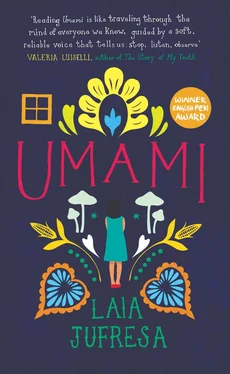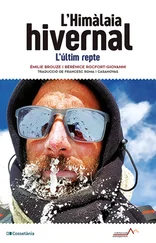‘You lot are the ones who are wrong with your litter-a-tour!’ he snaps. ‘It’s called literature.’
For Chihuahua, ‘you lot’ means anyone from the green states. And that’s anything south of the deserts. Marina likes arguing with him about this. It makes her feel more defined in her identity, like she belongs to something; in this case, to the South of Mexico. Chihuahua pointed out to her that all Southerners eat quesadillas without queso and sort of sing their sentences. She ticks both these boxes. Well, apart from the fact she wouldn’t get a whole quesadilla down her these days, cheese or no cheese.
One piece of popcorn for every commercial. That’s the deal she’s made with her herself. And she’s more or less sticking to it when the doorbell rings. Finally! She freezes on the spot. She knows Chihuahua can see her through the window, because many a night, before entering the mews, she watches the neighbors from across the street through their sheer curtains, which are just like hers. Unobserved, Marina studies the motionless figures, which look like cardboard cutouts offset by the blue light of the television, and she confirms another of her suspicions: that routine kills love.
After the doorbell, Marina eats four pieces of popcorn in a row. That makes twenty-three, or maybe twenty-five. The movie’s soundtrack is the rain against the water tank: she likes watching the TV, not listening to it. Then, three bangs on the window facing out onto the street. Typical. She doesn’t move. Chihuahua goes on banging. He must be soaked. Marina wants to know if he’s drunk, so she stands up and opens the curtains with the most neutral face she can muster. But it’s not Chihuahua. It’s a woman. A stranger holding a black plastic bag above her head: a sorely ineffectual substitute for an umbrella. Her hand is resting on the window she’s just pounded on for a fourth time. It’s a small hand, and something about the way she rests it on the wet glass fills Marina with tenderness. It’s as if she were holding it there waiting for Marina to do the same. Marina points at herself with her index finger.
‘Me?’
The woman nods.
‘Don’t talk to strangers,’ was one of the pearls of wisdom her brother gave her when she finally called home to confess she’d moved to Mexico City.
‘Don’t open car windows either: not to street vendors, not to the police.’
‘I don’t have a car,’ Marina told him.
‘Well, in case you happen to go in one,’ he’d said. And she remembers this had pissed her off. Why didn’t he say, ‘Well, when you do have one’?
To open the main door to the mews Marina has to leave her house and run to the entryway. Oh, what the hell. She slips on her flip-flops, opens the door and makes a run for it. She hadn’t taken into account the hail: now the floor drains are clogged and the central passageway is a river, out of which only the very tip of the bell pokes out. Marina opens the main door and the woman steps inside.
Belldrop Mews is so called because, when my grandparents’ house partially collapsed in the 1985 earthquake, a huge bronze bell set inside a niche on the facade fell and buried itself in what was the house’s yard and is now the open passageway connecting all the houses in the mews. Almost all of us who live here have to skip over the tip of the bell (a chunk of metal protruding from the floor) to enter or exit our houses.
*
Agatha Christie dropped by with her friend, Beto’s daughter, what’s her name? Pina. What a god-awful name: the only thing that makes up for a name like that is that she’s going to be an absolute knockout.
‘Does your wife have a grave?’ they asked me.
I told them she does and they gave me some flowers. Agatha Christie explained she bought them for her sister because today is the 353-day anniversary of Luz’s death, and that this is a palindrome, so they went to buy her flowers from the garden center, but now there’s no one to take them to the cemetery. I asked them if they learned the word palindrome in school and for some reason they burst into hysterics.
‘Ana is my school,’ Pina said.
Something I didn’t tell them, but which comes to mind now that they’ve gone and I’m thinking about the flowers and the yellow sweater, is that perhaps what the Pérez-Walkers need to find solace is a machine like my Nina Simone PC: a direct line to the dead.
Noelia loved Nina Simone.
‘Why did the gods make me big-bootied but not black?’ she’d complain when we listened to her.
If you’d asked Noelia what she would have changed about herself, she would have answered that she’d like to be able to sing. Not that I ever asked her. There was no need. Noelia reminded you of these things, never let you forget her defects, as if to stop you from loving her too much.
‘Come on, it was you who had a thing for the black girls, Alfonso.’
‘That’s true.’
‘Did you put those flowers in water?’
‘Of course, my brown sugar.’
‘And count the days?’
‘No chance. In my mind, you always died yesterday.’
*
‘You know the type?’ was something Noelia would say a lot, above all when she wanted to make sure that whoever she was talking to had understood whatever generalization she’d just come out with. For example, she might say about a nurse, ‘She’s one of those women who thinks she’s really broken the mold, you know the type?’ And about some anesthetist or another, ‘That guy would bite his tongue till it bleeds, you know the type?’ Or, about the owner of the garden center next door: ‘He’s the kind of man that crashes at the first sign of a curve, you know the type?’
I have to confess, I practically never knew the type she was on about, either because Noelia’s definitions belonged to a vernacular I wasn’t familiar with, or, more often than not, because she made them up off the top of her head. But after the first few years of extreme frustration (frustration for Noelia because I simply couldn’t keep up with her), I ended up adopting a habit, one of many. Anything to keep the peace.
The truth is, — and I’m not saying this because I’ve worked out that Noelia, wherever she is, is reading what I write — I was fond of her generalizations. They were always original, or at least they seemed as much to me, someone who spent most of his life with his head in the clouds. Unlike me, my wife was in touch with the world: awake, aware of everything around her, including the mundane things that were lost on me and which it was my genuine pleasure to be made aware of. Like watching a good movie or reading a good book. At first they embarrassed me, but as time went on I came to respect the categories my wife invented. There was something almost Kantian about them: a will to develop a system. You-know-the-type was Noelia’s way of organizing the people who came into our lives, and it has to be said that she was really quite good at it. She had a witch’s intuition. One day an intern started working at the institute, and Noe, having only seen her one lunchtime, said to me, ‘That one will climb the ladder faster than ivy, and good for her.’
Within a year, ‘that one’, with her measly Master’s degree, had a position almost equivalent to mine, even though I, the fool that I am, hold not one but two PhDs.
The point is that I found a way to deal with you-know-the-type so that even in my social ignorance I could follow the conversation, and Noelia could build upon her catalogue of types at her leisure, convinced that I was following her to a T. I’ve always been proud of this excellent little solution, but in fact I ripped it off from Beto’s wife.
Before her sudden disappearance from the mews, I noticed that Chela, when she didn’t understand what we were talking about at the table after dinner — which was basically every time we talked about politics, which was basically every time we stayed up talking at the table after dinner — pulled a very specific face: one that made her seem interested, reflective, ever so slightly dissenting, and which masked her absolute ignorance. The face was simple: she pursed her lips. Obviously, this had a far more satisfactory effect on her, who’s a peach, than on a face like mine, which has more of an overripe-papaya look about it. But I copied her anyway, adding to it from my own cache a simultaneous, slow nod. And unbelievably, it worked. So when, for example, Noelia said to me, ‘Blond but with her roots grown out, you know the type?’, I would purse my lips and nod slowly, and she, satisfied she’d made it perfectly clear what kind of creature we were talking about, would happily babble on without having to stop for another round of frustrating elucidations.
Читать дальше












